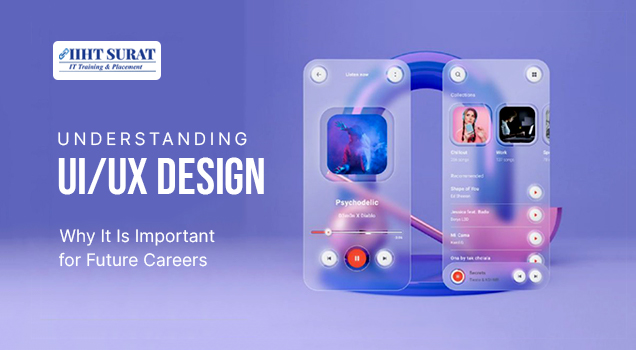Understanding UI/UX Design: Why It Is Important for Future Careers

Table of Contents
ToggleTechnology shapes our modern lives, providing digital interfaces that facilitate interactions. Crucial to these interfaces are UI (User Interface) and UX (User Experience) design principles. An UI UX design course in Surat teaches you building digital products that are both beautiful and easy to use, leading to a great user experience. This article takes a closer look at UI/UX design – what it is, why it matters today, and why taking a UI UX design course for beginners could be a smart move for your career.
What is UI Design?
User interface design is all about making the visual elements you see and use on websites, apps, and programs look good and work well. Its goal? Crafting appealing, intuitive interfaces for seamless user experiences. Every detail matters, from webpage layouts to color palettes and typefaces. Here are the cornerstones of impactful UI Design:
- Layout : Serves as the arrangement of elements on a screen, guiding users through a product’s interface with logic and ease.
- Colors : Play a significant role in the visual hierarchy, influencing mood and drawing attention to key elements.
- Typography : Involves the selection and use of typefaces to enhance readability and interaction.
- Icons and Symbols : These are pictures that stand for information or actions, making it easier to understand without using a lot of words.
- Interactivity : The design of interactive elements like buttons and forms that respond to user inputs, enhancing the UX.
What is UX Design?
While UI makes interfaces beautiful, UX makes them effective. User experience design is all about making sure people enjoy using digital products. It means figuring out what users need, making things easy for them to use, and keeping them happy. UX design keeps changing to better fit user needs. The pivotal elements of user experience design encompass:
User Research
User Research involves studying how individuals behave, what they want, and why they do things by observing them, analyzing tasks, and gathering feedback.
Information Architecture
Information Architecture is about organizing and presenting data so users can easily find what they need without getting frustrated.
User Journeys and Flows
User Journeys and Flows map out every step a user might take when using a product, helping identify real motivations and needs. They’re visual or conceptual pathways.
Wireframes and Prototypes
Wireframes are basic, low-detail visuals showing a product’s framework. Prototypes are interactive mockups with more details.
Usability Testing
Usability Testing lets real users try out a product, providing direct input on how they use it – an essential method for ensuring functionality.
Importance of UI/UX Design for Future Careers
Digital transformation sweeps across sectors, fueling a surging demand for UI/UX designers adept at crafting exceptional user experiences. Tech titans and budding startups alike share an acute need: developing digital offerings that captivate and delight users. User experience design courses design not only open doors to various fields but also prepare professionals for a future ruled by digital spaces. As technology keeps developing at a rapid pace, the capability to create simple-to-use and compelling digital experiences turns into a priceless asset.
UI/UX Design Trends for the Future
Immersing oneself in emerging design trends and technologies remains vital for staying competitive in the UI/UX realm. New tech like voice commands, hand gestures, and augmented reality (AR) brings new challenges and chances for designers. As these areas grow, designers become super important for making sure everyone can use these technologies and have a good experience.
Keeping up with the latest in UI/UX doesn’t just make using devices better; it also opens up exciting career paths for designers who are up-to-date and have a UI UX design certification, ready to change how we use digital tools. Here, we explore concise overviews of each trend and its professional implications :
- Voice UI and Conversational Interfaces : With more gadgets listening to us, learning to design voice commands is key.
- Gesture-Based Interfaces : Simple swipes and taps can make touchscreens much easier to use.
- Augmented Reality (AR) and Virtual Reality (VR) : Getting good at AR and VR design can lead to cool new experiences in games and apps.
- Dark Mode Interfaces : Dark mode interfaces shine – ensuring modern app and web designs adapt smoothly is paramount.
- Inclusive and Accessible Design : Focus on accessibility opens doors to specialized roles in user-centric design.
- Microinteractions : Crafting microinteractions is vital for creating engaging and intuitive user experiences.
Rapidly progressing niches within the UI/UX design domain herald thrilling prospects for specialists in these realms. This paves the way for groundbreaking advancements and trailblazing roles within the ever-evolving digital world. Innovative professionals can seize these emerging opportunities, shaping the future of user experiences with cutting-edge solutions.
Tips for Getting Started in UI/UX Design
Young professionals aspiring for UI/UX careers should begin by grasping design fundamentals and user-focused mindsets with a UI/UX design bootcamp. Crafting a portfolio highlighting abilities proves essential. Initiate by participating in online design circles, honing skills via real-world endeavors, and continually studying emerging tools and tendencies.
For a comprehensive UI UX design course for beginners that covers everything from the basics to advanced concepts in UI/UX design, IIHT Surat offers a robust . With a curriculum designed to give students hands-on experience, from software basics to advanced design tools like Adobe Photoshop, Figma, and Adobe XD, IIHT Surat prepares you for a successful career in UI/UX design. Features like UX design certificate programs, 100% job assistance, and guidance from expert IT teachers make IIHT Surat an excellent choice for aspiring designers.
Conclusion
User Interface (UI) and User Experience (UX) design extends far beyond aesthetically pleasing visuals; it revolves around curating technology interactions that are accessible, intuitive, and gratifying for all users. As digital marketplaces continue evolving, the need for adept UI/UX designers will rise exponentially. Whether you’re starting a new career or thinking about changing paths, now is a great time to dive into UI/UX design. With thorough UI UX design programs, like the ones IIHT Surat offers, you can open the door to a rewarding and exciting career.
